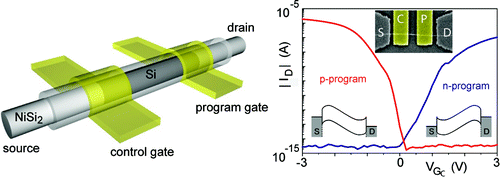Universal Transistor Could Enable Much Smaller Circuits
German researchers claim to have developed the first transistor that can configure itself to either being a n-type or p-type field-effect transistors (FETs). Current CMOS transistors are locked into a static state of being a p- or n-type transistor.
According to Physorg.com, the research "Synthetic nanowires are used to realize the proof-of-principle" was recently published in an issue of the journal Nano Letters and could lead to smaller semiconductors that require far fewer transistors than today's devices. While the research is in its nascent stages, the scientists claim that their dynamic transistor revealed encouraging electrical characteristics, "including a record on/off ratio and reduced leakage current compared to conventional nanowire FETs," Physorg wrote. Future work will focus on improving the transistor's performance.
According to the scientists, the reconfigurable transistor is "enabled by employing an axial nanowire heterostructure (metal/intrinsic-silicon/metal) with independent gating of the Schottky junctions." Other than traditional field-effect transistors, their invention uses "selective and sensitive control" of charge carrier injections at each Schottky junction to monitor "charge carrier polarity and concentration". This feature would allow the FETs to be reconfigured during their operation and execute virtually any Boolean logic computations and provide more design flexibility for hardware engineers.
Get Tom's Hardware's best news and in-depth reviews, straight to your inbox.

Douglas Perry was a freelance writer for Tom's Hardware covering semiconductors, storage technology, quantum computing, and processor power delivery. He has authored several books and is currently an editor for The Oregonian/OregonLive.
-
allenpan geeze, smaller FET = smaller embedded system, lower current leak, such as smaller replacement organs, monitors so onReply -
house70 That's pretty awesome. Means that circuits can re-configure at a hardware level. Multi-use chips for all your needs.Reply
Now, THAT"S something that is worth a patent! -
cyprod Okay, I studied ASIC design in college. It was actually my specialization, though I'll admit I was never able to land a job in ASIC design. But still, I took those classes through the 500 level, most of the way to a masters and created functioning silicon. I know every word mentioned in there. I'm familiar with every concept mentioned. And yet, it all sounds like gibberish. n-type and p-type are determined by their substrate. n-type, negative charge. p-type, positive charge. The difference between n-type and p-type is if you apply a positive charge to the gate to turn it on, or apply a negative charge to the gate to turn it on. But historically, p-types are extremely large on silicon, and as such, takes up a lot of real estate, so because of that though CMOS is ideal for leakage speed, nobody uses them, because they're too expensive to produce. Everybody strictly uses n-type transistors. How are you changing the transistor type without fundamentally changing the charge of the substrate. I mean, hell, it'd be a big enough of an advancement just to make a p-type that's the same size as an n-type, and to hell with them switching.Reply -
DRosencraft Reply9335599 said:can someone translate this? whats the possible effect on humans life?
I'm not 100% sure on this, but the basics are that if this works, any electronic device that relies on transistors could be manufactured cheaper and smaller becuase of not needing to include current switching technology. In other words, future devices like various PC components can be made even smaller and more efficient. How much? That I do not know. -
saint19 lord captivuscan someone translate this? whats the possible effect on humans life?Reply
Basically, better power use and less lose of power in electric components. -
lamorpa lord captivuscan someone translate this? whats the possible effect on humans life?The satisfying knowledge of a job well done.Reply -
memadmax The article tells you what you need to know: "could lead to smaller semiconductors that require far fewer transistors than today's devices"Reply
Be a proactive reader, not passive, no matter how bland the material is.....
